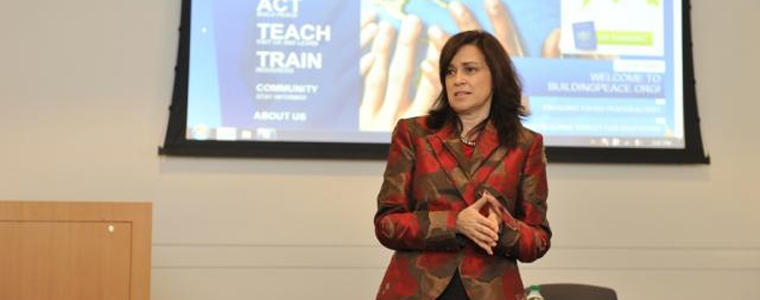USC Students Visit USIP, Talk Public Diplomacy
USIP's Tara Sonenshine talks with a group of students studying public diplomacy from USC.

Graduate students from the Public Diplomacy program at the University of Southern California visited USIP headquarters to tour the building and discuss public diplomacy with USIP’s Executive Vice President Tara Sonenshine on February 9, 2012. Sonenshine, nominated to be the undersecretary for Public Diplomacy at the U.S. State Department, explained the way she sees the world during a wide-ranging conversation with the students as one stop in a series of their visits to agencies around Washington in early February.
Sonenshine told the students she believes public diplomacy is an opportunity to shape the way people think and feel about America and that she hopes to advance the American narrative in terms of a broad range of themes, from women to entrepreneurial empowerment to national security, countering violent extremism and expanding our understanding – and our message – throughout the world, particularly in the Asia Pacific.
The work USIP does to prevent and manage violent conflict intersects in many ways with the charge Sonenshine will be given when she assumes the position at the State Department, just across the street.
As she contemplates her new job, if confirmed, she says she looks at the assignment as “whole-of-government agency,” not just as one organization. “The key is not to get trapped into seeing it as the State Department, or the Pentagon, but in finding your way around the mission, and not so much its layers of bureaucracy.”
Asked by one student how to find the job you’re really good at, Sonenshine, a former contributing editor at Newsweek and editorial producer of ABC’s Nightline, said she likes to give people the “Barnes and Noble Test:” what section would they find themselves drawn to if dropped into a bookstore. That can tell someone so much about what they want to do with their lives.
“I think it’s important to follow your passion,” she said.
Public diplomacy students from the University of Southern California at USIP for a conversation with Executive Vice President Tara Sonenshine in February pictured with USIP's Ann-Louise Colgan.
The group also had an opportunity to hear about USIP's public education work and to see a preview of the multimedia exhibits of the Global Peacebuilding Center.




